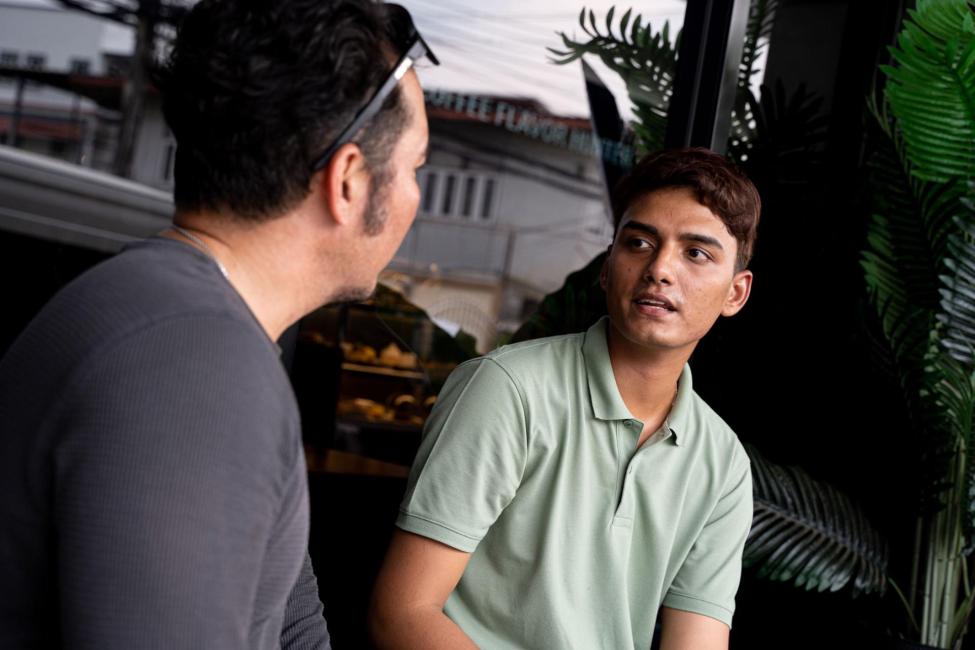-
Who We Are
WHO WE AREThe International Organization for Migration (IOM) is part of the United Nations System as the leading inter-governmental organization promoting since 1951 humane and orderly migration for the benefit of all, with 175 member states and a presence in over 100 countries.
About
About
IOM Global
IOM Global
-
Our Work
Our WorkAs the leading inter-governmental organization promoting since 1951 humane and orderly migration, IOM plays a key role to support the achievement of the 2030 Agenda through different areas of intervention that connect both humanitarian assistance and sustainable development.
Cross-cutting (Global)
Cross-cutting (Global)
- Data and Resources
- Take Action
- 2030 Agenda
Native Rohingya siblings Sabee and Husna have spent their whole lives in Thailand after their parents fled the persecution in Myanmar in the 1990s.
Both know what it feels like to be welcomed in a country, while never fully feeling like they actually fit in. “Although, growing up, I was able to make friends, my skin colour always made me different,” says Sabee.
“Sometimes, it can be difficult to access public services and facilities,” echoes Husna, explaining that there is a lack of understanding of her type of documentation in Thailand.
A Rohingya born in Malaysia, Abdul shares the same sentiments. “I have made many friends who have given me a lot of support, but Rohingyas still face some limitations in host society, such as in seeking employment.”
Sabee, Husna and Abdul have all experienced the struggles of being of an “outsider” – the same driving force that has inspired them to help their fellow Rohingyas by working part-time as interpreters with the International Organization for Migration (IOM).
Sabee and Husna started this career path after a call by Thailand’s Ministry of Social Development and Human Security in 2015, when hundreds of Rohingyas arrived in the country by boat. They joined dozens of Rohingyas in the ministry’s training programme but were two of the only five that received an interpretation certification, a testament to their fluency in Thai.
This has opened doors for them to work not only for the government, but with multiple international and non-governmental organisations. “It has been very rewarding to help others over the years. It makes me happy to see them start new lives,” expresses Sabee.
For Husna, working as an interpreter has helped her mature and build key skills. “I learned the importance of teamwork and being organised.”
Meanwhile, Abdul was a perfect fit for the interpreter role, being proficient in English, Malay, Indonesian, Hindi and Urdu. Abdul spent a few years in Indonesia with his family, where he learned English through classes offered by IOM.
“At IOM Malaysia, I was surrounded by colleagues who were understanding and respectful. Everyone had a positive attitude,” he reflects on his experience.
Despite the positive sentiments about being able to help others understand and communicate, working as an interpreter is not without its challenges.
“It can be difficult emotionally, listening to what many fellow Rohingyas have had to go through,” remarks Sabee.
Husna explains that, although allowing others to communicate is incredibly empowering, she sometimes feels powerless in her job. “I am often asked to explain certain laws and policies, but I don’t have the power to give people everything they need.”
Nevertheless, none of them would trade away the growth they have gained through this working experience.
This year, Abdul moved to the United States and continues to give back, now helping fellow refugees as a refugee case manager in Colorado.
“Life has changed so much. I have freedom. After a year, I can become a permanent resident here and, five years later, possibly citizenship. This means I can vote and finally travel the world,” he conveys his joy.
For Sabee and Husna, the job allows them to earn an income as they look toward their future. Sabee wants to gain a formal education, while Husna is waiting to receive Thai citizenship.
For millions of Rohingyas displaced around the region, it can often feel like a never-ending waiting game to start new lives abroad. The contributions of multilingual Rohingyas like Sabee, Husna and Abdul are vital in ensuring that they get through such uncertain moments.
“Everything comes to us at the right time. Let’s be patient. Our time will come,” Husna concludes – a piece of advice she has given to many Rohingyas she has crossed paths with through her job.
IOM’s work with interpreters to facilitate assistance to Rohingya refugees in Malaysia and Thailand is supported by the European Union and U.S. Department of State Bureau of Population, Refugees, and Migration (PRM).
This story was written by Miko Alazas, IOM Türkiye Media and Communications Officer, and Siti Munawirah Ahmad, IOM Malaysia Communications Assistant.


